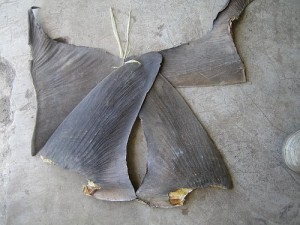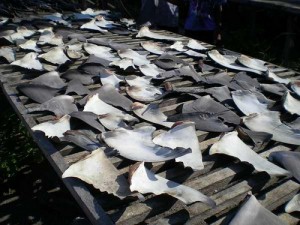Modern day pirates cross the oceans not for gold, but for shark fins, writes Lindsay Jennings, researcher at the Marine Conservation Institute on Sharkdefenders.com. Illegal fishing leads to the indiscriminate catching of millions of sharks each year, driving down populations. Just to try to fulfill global demand for shark products while .

“Forget the idea of an eye-patch wearing, sword-wielding, swashbuckling pirate. Pirates these days traverse the oceans not for gold, but for fish. And some of the most lucrative of those fish are sharks, with prices reaching upwards of $1,000/kg for fins. Shark products (fins, meat, oil, teeth, liver, and skin) are still in demand in many countries, although recent media reports claim demand may be on the decline. But a simple lesson in economics will tell anyone that this system of supply and demand is unbalanced, with too many boats catching too few fish.
Seafood, ahead of rubber and coffee, is the most heavily traded global commodity, with no signs of slowing down despite increasing concerns over global food security. These pirates, or illegal fishermen, are often from areas of political instability and limited opportunity; they turn to a trade which pays – illegal shark fishing.

Shark sanctuaries
Illegal, unreported, and unregulated (IUU) fishing leads to the indiscriminate catching of millions of sharks each year, trying to fulfill global demand for shark products while driving down populations. Shark fishing is legal in many parts of the world, but there are unique places, such as shark sanctuaries and marine protected areas, where fishing for sharks is illegal. Short of a full sanctuary, countries may also implement fishing regulations such as finning bans, area or seasonal closures, gear restrictions, and species-specific prohibitions. Shark fishing in designated protected waters is clearly illegal, but there are also two other components of IUU fishing, the unregulated and unreported fishing, that contribute to shark mortality. These will be addressed in a later blog.
Fortunately, recent technology is allowing us to see just who is fishing and where they’re fishing. Earlier this year, 65 dead shark carcasses were found floating in a mile-long illegal gill net off Texas, thought to be left by Mexican poachers. These kinds of nets, dubbed ‘walls of death,’ are illegal in the U.S. as they are highly effective in catching marine life, from sharks to sea turtles, and are often found drifting in the water far after fishers abandon them. In 2012, Texas authorities recovered a single, three mile gill net holding 3,000 juvenile sharks, an entire generation’s worth of animals. In Peru demand for shark fins drives the illegal dolphin slaughter of more than 15,000 dolphins every year for their skin to be used as shark bait, even though it is illegal to hunt or kill dolphins in Peru.
Hammerheads
In the waters around Costa Rica’s Cocos Island, a shark-rich marine reserve and migratory corridor for endangered hammerheads, illegal fishers continually hunt sharks within the reserve boundaries. Illegal fishing, pirate fishing, black market fishing, regardless of term, is labeled as the reserve’s biggest threat. There is inadequate enforcement, little accountability or repercussions for breaking the law, but big payoff. Six of thirty-three vessels caught have been targets of criminal investigations, many others given only a slap on the wrist if enforcement agencies cannot catch them red-handed.
The Galápagos, once Darwin’s stomping grounds, named a ‘living museum and showcase of evolution,’ is no stranger to illegal fishing. Cheap and easy to use, long lines are set by fishermen to catch whatever animal will take the bait. Hundreds of thousands of dollars are at stake from blue, dusky, Galápagos, and hammerhead sharks, and the combination traders paying top dollar for shark fins and little enforcement is an open invitation to illegally poach.
Protected waters, like those of the Galápagos and Cocos Island marine reserves act as a draw for illegal fishing activity, away from the watchful eye of authorities. Enforcement needs to be strong, penalties stiff, and governments, from law enforcement to the judiciary, steadfast in their laws and authority to stop illegal poaching of sharks and subsequent denial of port entry of those products. By turning away illegally-caught sharks at port, national and international policies can deter IUU fishermen and stop this kind of activity from paying off.
 Illegal fishing laws, like the international treaty, Port States Measures Agreement (PSMA), while ostensibly a security measure, acts as conservation measures by requiring countries to exert tighter controls over what comes into their ports. Illegal fishers rely on loopholes in laws and relaxed inspections to get away with offloading their catch. International efforts, like PSMA, can increase the ability to inspect and turn away illegal cargo.
Illegal fishing laws, like the international treaty, Port States Measures Agreement (PSMA), while ostensibly a security measure, acts as conservation measures by requiring countries to exert tighter controls over what comes into their ports. Illegal fishers rely on loopholes in laws and relaxed inspections to get away with offloading their catch. International efforts, like PSMA, can increase the ability to inspect and turn away illegal cargo.
As seafood consumption and subsequent fishing efforts continue to rise, it is essential to link both shark conservation and illegal fishing efforts. Shark finning and shark fin soup have for years been the focus of conservation campaigns, but cracking down on illegal fishing will also help decrease shark mortality. For measures like PSMA to be effective for illegal fishing and shark conservation, we need to continually pressure countries to adopt treaties to close those loopholes.
It is no secret that illegal fishing takes effort to enforce. Though only five of the top 26 shark-fishing countries lack a national plan of action for illegal shark fishing, poachers are adept at skirting laws and evading law enforcement. Luckily, tools like PSMA already exist aimed at closing illegal shark fishing loopholes by ensuring only legally caught sharks and shark products enter countries’ ports. This international agreement, when adopted, would markedly increase the rate and ease of enforcement as well as stop illegal shark fishing from paying off. When there are no more places for fishermen to hide and the incentive stops, so can illegal shark fishing.
Lindsay Jennings is an Ocean Policy Fellow at the Marine Conservation Institute and part of University of Miami’s RJ Dunlap Marine Conservation Program. You can follow her on Twitter. –
This article was first published on Sharkdefenders.com.
